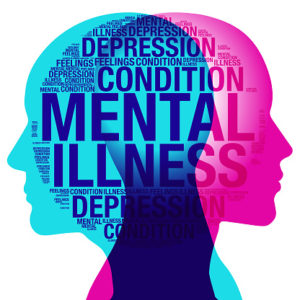
Tis’ the season for New Year Resolutions! We are all talking about shedding some holiday pounds, keeping ourselves more organized or just living our best lives in 2019. While striving towards those goals, why not included your mental health in this years resolutions?
Did you know that mental illness affects millions of Americans, yet not surprisingly, many of those who need help do not receive it. There are many reasons why – it could be due to limited availability of services, or a strong distrust of others, or those who are mentally ill might have such a sense of hopelessness that they do not seek care.
While all of these are factors as to why someone doesn’t seek support, perhaps the biggest single reason is a sense of fear and shame associated with admitting help is needed. This sense of shame is very common and it is only reinforced by society, which has attached stigmas to mental illness. The beliefs the public has about mental illness leads those who need help to avoid it so they are not labeled as “crazy” and have their condition negatively affect their personal relationships and career goals.
Getting society to overcome the stigmas associated with mental illness is the key to having more individuals come forward, but unfortunately negative attitudes and beliefs toward people who have a mental health condition are common. These stigmas can lead to obvious and direct discrimination, such as someone making a negative remark about mental illness or it may be unintentional or subtle, such as someone avoiding an individual because they assume they could be unstable, violent or dangerous due to mental illness.
Those with mental illness should never be ashamed of their condition and here are some reasons why:
- According to the World Health Organization, one out of four people will experience mental health problems at some point in their lives.
- Shame is pretty much guaranteed to make things worse. Feelings of shame are proven to have detrimental effects on our mental and physical health
- Mental illness is no one’s fault. No one asks to have a mental illness and it is definitely not a choice we make.
- We’re not ashamed when our bodies get sick, so why should we be ashamed when our minds aren’t in top form.
- There is no normal – our minds are complex things and no single brain is the same
- Our mental health doesn’t define us. Don’t let your mental illness become who you are, it is just one aspect of you.
It’s time to speak out against the stigmas associated with mental illness and reframe the way we see it. Getting help is not a sign of weakness. It is a sign of strength.
Flushing Hospital advises anyone who feels they need help to get it. Don’t let the fear of being labeled with a mental illness prevent you from seeking help. Treatment can provide relief and help you in life.
To make an appointment at Flushing Hospital’s Outpatient Mental Health Center, please call 718-670-5522.
All content of this newsletter is intended for general information purposes only and is not intended or implied to be a substitute for professional medical advice, diagnosis or treatment. Please consult a medical professional before adopting any of the suggestions on this page. You must never disregard professional medical advice or delay seeking medical treatment based upon any content of this newsletter. PROMPTLY CONSULT YOUR PHYSICIAN OR CALL 911 IF YOU BELIEVE YOU HAVE A MEDICAL EMERGENCY.




